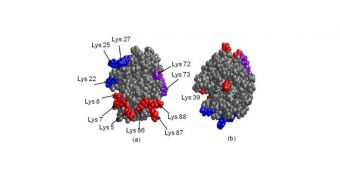Advancements in nanotechnology promise to yield new methods of delivering drugs, as well as perform other repair operations, in the human body. In a recent study, experts took a closer look at the effects that exposure to nanoparticles has on proteins.
Determining how the two interact is critically important, if we are to continue our investigations into potential biomedical applications for nanotechnology. The new study was conducted by experts at the Rensselaer Polytechnic Institute (RPI).
Details of their study were published in the February 2 online issue of the esteemed scientific journal Nano Letters, in a paper entitled “Position-specific chemical modification and quantitative proteomics disclose protein orientation absorbed on silica nanoparticles.”
The investigation resulted in the development of a new scientific tool capable of discovering how proteins orient themselves on the surfaces of different nanoparticles.
This instrument could come in very handy in future investigations, which will try to create methods of using nanoparticles to control aspects such as protein orientation, structure, and function. Before this can be done, experts need to know that the particles are safe.
“To date, very little is known about how proteins interact with a surface at the nanoscale,” explains the RPI Howard P. Isermann ’42 Professor of Chemical and Biological Engineering, Jonathan Dordick.
The expert, who was a co-corresponding author of the paper, is the director of the RPI Center for Biotechnology and Interdisciplinary Studies (CBIS).
“With a better understanding of how a protein interacts with a surface, we can develop custom nanoscale surfaces and design proteins that can do a variety of amazing tasks in the human body,” the researcher explains.
“In addition to improved healthcare, this work will also help enable the manufacture of a wide range of new hierarchical composite materials […] that will revolutionize our ability to solve many critical problems facing society worldwide,” scientist Richard Siegel adds.
The investigator holds an appointment as the Robert W. Hunt Professor of Materials Science and Engineering at RPI, and is also the director of the Rensselaer Nanotechnology Center. He explains that this study, and others like it, will eventually lead to improved healthcare for everyone.
The investigation was supported by a grant from the US National Science Foundation (NSF).

 14 DAY TRIAL //
14 DAY TRIAL //